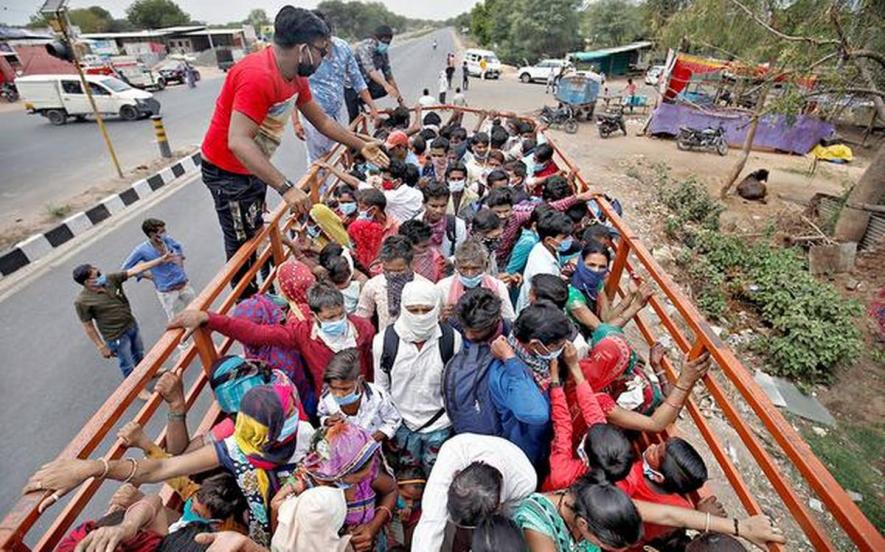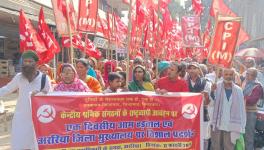Exclusive Trade Unions for Migrant Workers Take Shape Across States

Kolkata: Trade unions exclusively of migrant workers, whose plight after the lockdown in late March was a pointer to administrative lapses, are taking shape. The initiative is being taken by the Centre of Indian Trade Unions (CITU), the labour arm of the Communist Party of India (Marxist).
CITU sources NewsClick spoke to conceded that formation of trade unions exclusively of migrant labourers engaged their serious attention as news flowed in about how workers stared at starvation as they walked back from their workplaces in scorching heat to their distant native places during the lockdown. They also conceded that only because of the tragic circumstances they could have an idea about the number of affected migrant workers dependent for their livelihood on various trades in urban areas and growth centres.
It was an eye opener for them in the sense that the total number of people migrating in search of livelihood would be much larger if seasonal migrant labourers, who are hired for farm or construction jobs, are included in the count, the CITU sources added.
Asked about the progress of this initiative, they said they were happy with the results in Karnataka. In West Bengal, they have applied for registration of the proposed union. In Maharashtra, the matter is engaging the attention of state CITU leaders. These states were identified after determining the scope available.
In Karnataka, an umbrella organisation has been floated under the name and style of Inter-state Migrant Workers’ Federation of Karnataka (IMFK). It secured registration on June 26, 2020 under the Trade Union Act, 1926 and the Inter-State Migrant Workmen (Regulation of Employment and Conditions of service) Act, 1979.
General secretary of CITU Karnataka M S Meenakshi Sundaram told NewsClick from Bengaluru that the thrust would be on unionising the large number of in-bound workers who come to the state for earning their livelihood. Not many people from the state are out-bound for finding jobs. The in-bound workers contribute significantly to value-addition, state economy and state gross domestic product. That explains our thrust, Sundaram said.
Founder-president of IMFK K N Umesh informed NewsClick that they began their journey with 179 members and had set a target of enrolling 50,000 members within a year. There is provision for direct individual membership as also for affiliation of trade-specific unions. That’s why the outfit has been registered as a federation, Umesh said.
West Bengal CITU unit recently applied for registration of a union under the name and style of West Bengal Migrant Workers’ Union (WBMWU) and the state Labour Department has called the office-bearers for a hearing on September 30, according to the outfit’s president Sheikh Mohammed Sadi. The thrust will be on unionising the out-bound workers estimated at over nine lakh. It does not mean that in-bound workers will not be within the union’s purview; but their number being much lower, the focus has to be on the out-bound workers, Sadi told NewsClick from Krishnanagar in Nadia district.
He contended that as such there is no contradiction as the ground reality differs from state to state and the state concerned has to determine its priority. “After all, the objective is to bring migrant workers under the fold of a union. The union’s job will be facilitated if the state labour department has a nodal officer. We will interact with our CITU counterpart in the state where issues have cropped up concerning workers who are earning their livelihood there. The nodal officer can help us by establishing contact with the relevant department to get the issues resolved,” he said.
The proposed union’s general secretary Abdul Mannan said that they have begun the work of identifying workers who can be approached for membership. “We have set a target of enrolling one lakh members within a year and we are hopeful of achieving the target,” Mannan told NewsClick from Raghunathpur in Murshidabad district.
Samir Mondol of Nadia district said, narrating his own experience during the lockdown, said that it took him full five days to reach his native place from Pune where he was working for the past over five years as a welder. Circumstances compelled him to remain at the workplace for over six weeks after the lockdown. He ran out of funds and had to borrow money to keep himself going. He covered a lot of distance on foot and at some places sympathetic truck drivers offered him a ride. After five days, he was back home. “If at all I am going back, it will be after the puja, Samir told NewsClick from his native place.
General secretary of CITU Maharashtra unit Advocate, M H Shaikh, said that his organisation was seriously considering the issue of floating a union exclusively for migrant workers and given the very large number of in-bound migrant workers to Mumbai, Thane, Pune and other places in the state, the focus of unionisation will, of course, will be on them. Asked whether the large number of ‘karigars’ from West Bengal working in Mumbai’s jewellery-making units too would be kept in view, Shaikh said: “We will consider keeping them too in our view.”
Significantly, Left Democratic Front-ruled Kerala does not want to launch a union for migrant workers, CITU state general secretary and Rajya Sabha member Elamaran Kareem told NewsClick. The trade-specific unions working in Kerala have among their members migrant workers also and the unions are sorting out their issues too with the help of the state government. “Therefore, we do not see the need for an exclusive union for migrant workers. An estimated number of 30 lakh migrant labourers from West Bengal, Bihar, Odisha, Assam and Uttarakhand are earning their livelihood in Kerala. The construction sector alone accounts for seven lakh workers. CITU, I am happy to tell you, is very active in Kerala”, Kareem told NewsClick.
Asked about the initiative to launch trade unions exclusively for migrant labourers, Dr Amitabha Kanjilal, head of the department of political science in Siliguri, said it is a good move, no doubt, but the chances of its success would greatly hinge on the goodwill of the state governments and other state agencies, which all these years did not care about pitiable lot of the migrant workers. “Hardly any effort was made to map the presence of migrant workers across the country for preparation of consolidated data about them. Such pitiable state of affairs despite the fact that the Inter-State Migrant Workmen Act was passed by Parliament way back in 1979. It’s a glaring example of a well-intentioned Act existing on paper and the Union and state governments doing little to implement its provisions,” Kanjilal said.
Under the 1979 Act, all establishments hiring inter-state migrants are to be registered with the designated authority and contractors who recruit such workers should be licensed by the specified authority. Contractors will be bound to provide details of all workmen when asked by the competent authority.
The Act lays down that there shall be no discrimination between local workers and migrant workers in payment of wages for the same job. It provides for equal pay for equal work irrespective of sex; it stipulates provision for residential accommodation and maintenance thereof, medical care facility during their illness and payment of to and fro fares and the duration of their visit to their native places should be treated as if they were on duty. But in reality, knowledgeable trade union quarters point out that migrant workers are always at the mercy of the contractors.
It is relevant to mention that the 1979 Act is one of the 13 acts that are proposed to be merged in the Occupational Safety, Health and Working Conditions Code 2019, which was passed by Lok Sabha on July 23, 2019. But it is still pending before the Rajya Sabha. It is likely to be passed in the Monsoon session, which is due to convene in a matter of days. The Centre has been assuring the workers that the 2019 code provisions are akin to that contained in the 1979 Act. But, trade unions have argued that there are several stiff provisions which confer sweeping powers on the authorities and may, therefore, be misused. The unions are against the move to integrate the 1979 Act with the 2019 Code. They have demanded faithful implementation to better the lot of migrant labourers.
Also read: Delhi Riots: Retd IPS Officer Julio Ribeiro Questions Delhi Police’s Probe
Get the latest reports & analysis with people's perspective on Protests, movements & deep analytical videos, discussions of the current affairs in your Telegram app. Subscribe to NewsClick's Telegram channel & get Real-Time updates on stories, as they get published on our website.
























